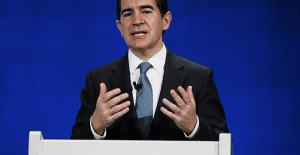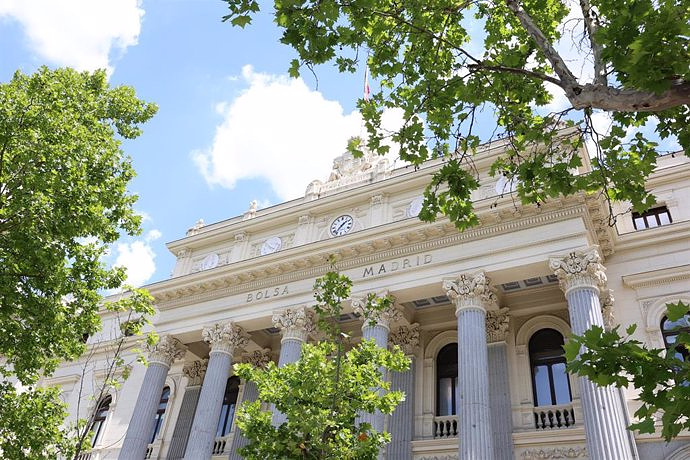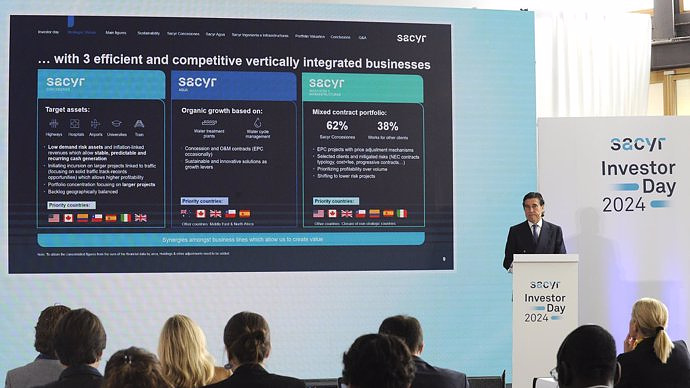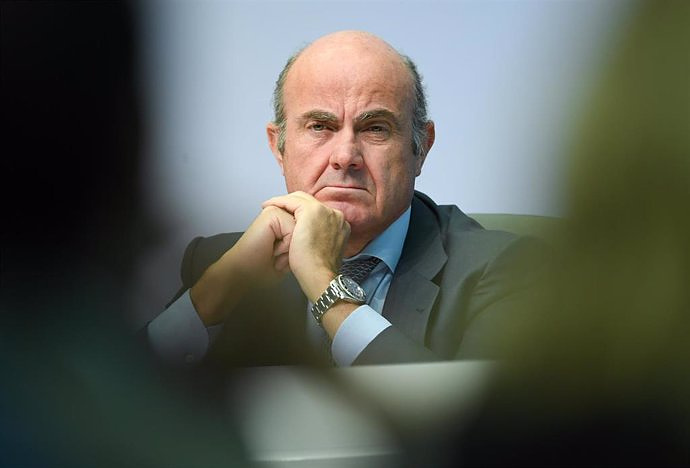The Upper House had appealed to be able to approve this Thursday the two amendments challenged by the PP
The Constitutional Court (TC) has ratified this Wednesday the decision that it adopted just 48 hours ago to suspend the parliamentary processing, already in the Senate, of the two amendments incorporated into the bill on sedition and embezzlement that seek to renew the law itself. TC, thus rejecting the appeal presented by the Upper House to be able to debate and vote on the proposed reform in its plenary session tomorrow.
After more than three hours of intense deliberation among its 11 magistrates, the court of guarantees has confirmed its initial resolution with the same votes with which it adopted it: the 6 of the conservative bloc against the 5 of the progressive minority, according to legal sources. consulted by Europa Press. The progressive sector has announced a particular vote.
And this after rejecting the challenges launched by Unidas Podemos (UP) and by the Prosecutor's Office against the president of the TC, Pedro González-Trevijano, and magistrate Antonio Narvaéz. Had they been removed, there would have been a change of majority in favor of the progressive bloc.
According to the same sources, the question of recusals has been rejected out of hand. González-Trevijano and Narváez have limited themselves to stating that they are not concerned, assuring that they have no interest in these amendments. Consequently, there has been only one vote referring to the appeal, in which the two questioned magistrates have participated.
Unidas Podemos (UP) has already raised challenges to the very precautionary measures claimed by the PP in its amparo appeal against the two amendments, but the TC considered that then it was not the right procedural moment.
Podemos had challenged again this Wednesday, arguing that these two magistrates have a "direct interest" in the aforementioned amendments not being approved because, if they did, they would be replaced by the two candidates nominated by the Government: former Justice Minister Juan Carlos Campo and the former high office of Moncloa Laura Díez.
The Prosecutor's Office had also been interested in opening a recusal incident against González-Trevijano and Narváez, observing an "unquestionable direct link of the aforementioned members of the Plenary with the object of parliamentary processing." In his opinion, the automatic incidence of said norm in the personal/professional situation of both was "objectively unquestionable".
González-Trevijano has had to convene this extraordinary plenary session with just a few hours to spare, after the Senate formulated an appeal to try to lift the very precautionary measures that the TC agreed two days ago at the request of the PP.
The intention of the Senate was to arrive on time so that in its plenary session tomorrow the bill could be debated and voted on --with all its amendments--, so that it would be definitively approved, after the Congress of Deputies endorsed it. In the past week.
This is the second extraordinary plenary session held by the TC in just 48 hours. On Monday, after more than nine hours, it agreed to admit the appeal of the PP and the very precautionary measures, an unprecedented decision, since in its more than 40 years of history it had never paralyzed a parliamentary process in the Cortes Generales.
As the TC reported at the time, the magistrates considered that the progress of the parliamentary process causes damage that is difficult to repair to the 'popular' legislators, who invoked article 23 of the Constitution, which includes the right to political participation of citizens through their representatives.
On the merits of the matter, the Constitutional Court explained that it gave entry to the 'popular' appeal because the violation alleged by the PP cannot be ruled out, taking into account the constitutional doctrine on the exercise of the right of amendment and the relationship of homogeneity that must exist between the amendments and the legislative initiative that is intended to be modified.
It also indicated that the matter raised in this amparo appeal has special constitutional significance because it raises a legal question of "relevant and general social repercussion," which also has "general political consequences."
The PP was directed, specifically, against the agreements of the Bureau of the Justice Commission of Congress by which both amendments were admitted for processing and against the decision of the president of this Commission, Felipe Sicilia, not to revoke them.
"EXTEMPORANEOUS" SUSPENSION
In its appeal, the Senate argued that the urgent suspension was an "extemporaneous" measure because, if it was in such a hurry - and hence its very precautionary nature - it should have been agreed last week, before the Lower House approved the bill with its amendments.
In this sense, he stressed that the ruling of the TC has affected him "directly" when in reality it is not the legislative seat that has adopted the agreements appealed by the PP, for which he understands that both the chamber and its members "are defenseless". .
It also argued that the suspension violates the requirements of the Organic Law of the Constitutional Court (LOTC), that is, that "it does not cause serious disturbance to a constitutionally protected interest or to the fundamental rights or freedoms of another person."
In this regard, it defended that "the suspension causes a disturbance of the utmost seriousness to a constitutionally protected interest, such as the fact that the Legislative Power of the Spanish State, embodied in the Cortes Generales (Congress and Senate), which represent the people Spanish, can fully exercise the functions constitutionally attributed to it, without undue interference".
However, it warned that the paralysis of parliamentary processing is "a disproportionate action" that constitutes "a precedent with unpredictable consequences", warning of "the possibility that the amparo remedy could be used as a means to disturb the exercise of the legislative function of the Cortes Generales".
THE RENEWAL OF THE TC
The underlying problem is that the TC has been waiting since June 12 for the renewal of the four magistrates that make up the third that the Constitution mandates to replace the Government and CGPJ: González-Trevijano and Narváez, appointed in their day by the Mariano Executive Rajoy; and Juan Antonio Xiol and Santiago Martínez-Vares, appointed at the time by the governing body of the judges.
The legal doubts about the possibility that the two Moncloa candidates could take office without waiting for the two from the CGPJ led to promoting and approving last July in Parliament an express reform of the Organic Law of the Judiciary (LOPJ) to return to the Council his power to appoint his two applicants to the court of guarantees.
But the negotiations within the CGPJ ran aground on December 2 due to the tacit veto of the conservative block to the candidate of their progressive counterparts, the magistrate of the Supreme Court (TS) José Manuel Bandrés, and the refusal of the latter to return to fatten their list of applicants (which came to have nine). In their first vote to nominate candidates, which took place on Tuesday, both sectors entrenched in their positions and frustrated the agreement.
In this context, 'morados' and socialists introduced the two amendments in the aforementioned bill: one so that the two CGPJ candidates are elected by a simple majority, instead of three-fifths; and another so that Campo and Díez can take office as magistrates of the TC without having to wait for the two nominees by the Council.

 Exploring Cardano: Inner Workings and Advantages of this Cryptocurrency
Exploring Cardano: Inner Workings and Advantages of this Cryptocurrency Seville.- Economy.- Innova.- STSA inaugurates its new painting and sealing hangar in San Pablo, for 18 million
Seville.- Economy.- Innova.- STSA inaugurates its new painting and sealing hangar in San Pablo, for 18 million Innova.- More than 300 volunteers join the Andalucía Compromiso Digital network in one month to facilitate access to ICT
Innova.- More than 300 volunteers join the Andalucía Compromiso Digital network in one month to facilitate access to ICT Innova.-AMP.- Ayesa acquires 51% of Sadiel, which will create new technological engineering products and expand markets
Innova.-AMP.- Ayesa acquires 51% of Sadiel, which will create new technological engineering products and expand markets Student camps will continue in the face of CRUE's "empty promises" and demand a "total break" with Israel
Student camps will continue in the face of CRUE's "empty promises" and demand a "total break" with Israel The Generalitat expresses its "total" opposition to BBVA's takeover of Sabadell
The Generalitat expresses its "total" opposition to BBVA's takeover of Sabadell Death toll rises to 107 from floods caused by heavy rains in southern Brazil
Death toll rises to 107 from floods caused by heavy rains in southern Brazil BBVA is willing to assume the possible reputational risk if the takeover bid for Sabadell does not go ahead
BBVA is willing to assume the possible reputational risk if the takeover bid for Sabadell does not go ahead How Blockchain in being used to shape the future
How Blockchain in being used to shape the future Not just BTC and ETH: Here Are Some More Interesting Coins Worth Focusing on
Not just BTC and ETH: Here Are Some More Interesting Coins Worth Focusing on Expociència expects to receive more than 4,000 visitors in the Science Park of the University of Valencia
Expociència expects to receive more than 4,000 visitors in the Science Park of the University of Valencia They develop devices for the precise diagnosis of cancer patients
They develop devices for the precise diagnosis of cancer patients UMH researchers are working on a high-quality apricot crop that requires less irrigation water
UMH researchers are working on a high-quality apricot crop that requires less irrigation water The UPV develops an application to improve the quality of life of patients with glioblastoma
The UPV develops an application to improve the quality of life of patients with glioblastoma A million people demonstrate in France against Macron's pension reform
A million people demonstrate in France against Macron's pension reform Russia launches several missiles against "critical infrastructure" in the city of Zaporizhia
Russia launches several missiles against "critical infrastructure" in the city of Zaporizhia A "procession" remembers the dead of the Calabria shipwreck as bodies continue to wash up on the shore
A "procession" remembers the dead of the Calabria shipwreck as bodies continue to wash up on the shore Prison sentences handed down for three prominent Hong Kong pro-democracy activists
Prison sentences handed down for three prominent Hong Kong pro-democracy activists ETH continues to leave trading platforms, Ethereum balance on exchanges lowest in 3 years
ETH continues to leave trading platforms, Ethereum balance on exchanges lowest in 3 years Investors invest $450 million in Consensys, Ethereum incubator now valued at $7 billion
Investors invest $450 million in Consensys, Ethereum incubator now valued at $7 billion Alchemy Integrates Ethereum L2 Product Starknet to Enhance Web3 Scalability at a Price 100x Lower Than L1 Fees
Alchemy Integrates Ethereum L2 Product Starknet to Enhance Web3 Scalability at a Price 100x Lower Than L1 Fees Mining Report: Bitcoin's Electricity Consumption Declines by 25% in Q1 2022
Mining Report: Bitcoin's Electricity Consumption Declines by 25% in Q1 2022 Oil-to-Bitcoin Mining Firm Crusoe Energy Systems Raised $505 Million
Oil-to-Bitcoin Mining Firm Crusoe Energy Systems Raised $505 Million Microbt reveals the latest Bitcoin mining rigs -- Machines produce up to 126 TH/s with custom 5nm chip design
Microbt reveals the latest Bitcoin mining rigs -- Machines produce up to 126 TH/s with custom 5nm chip design Bitcoin's Mining Difficulty Hits a Lifetime High, With More Than 90% of BTC Supply Issued
Bitcoin's Mining Difficulty Hits a Lifetime High, With More Than 90% of BTC Supply Issued The Biggest Movers are Near, EOS, and RUNE during Friday's Selloff
The Biggest Movers are Near, EOS, and RUNE during Friday's Selloff Global Markets Spooked by a Hawkish Fed and Covid, Stocks and Crypto Gain After Musk Buys Twitter
Global Markets Spooked by a Hawkish Fed and Covid, Stocks and Crypto Gain After Musk Buys Twitter Bitso to offset carbon emissions from the Trading Platform's ERC20, ETH, and BTC Transactions
Bitso to offset carbon emissions from the Trading Platform's ERC20, ETH, and BTC Transactions Draftkings Announces 2022 College Hoops NFT Selection for March Madness
Draftkings Announces 2022 College Hoops NFT Selection for March Madness




























